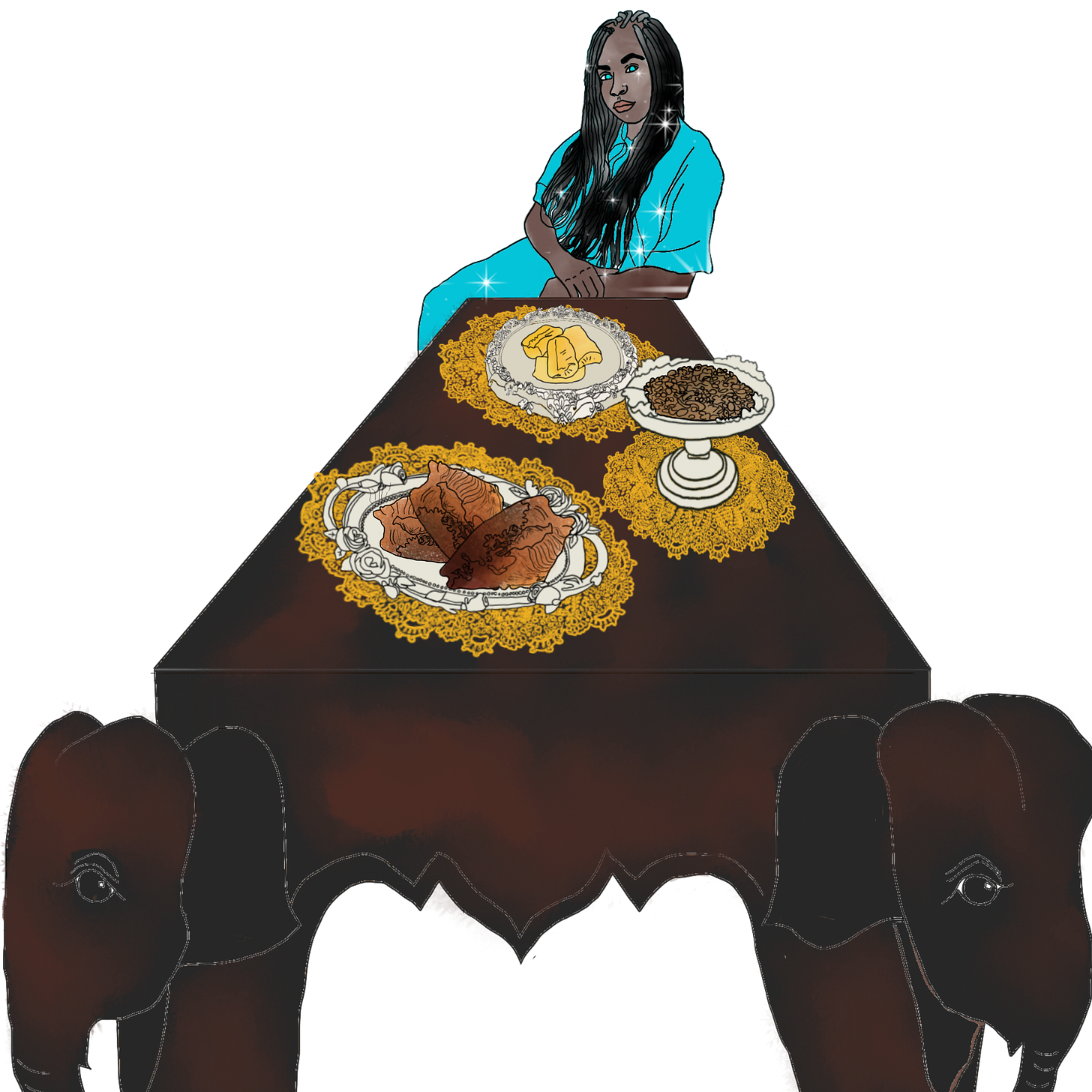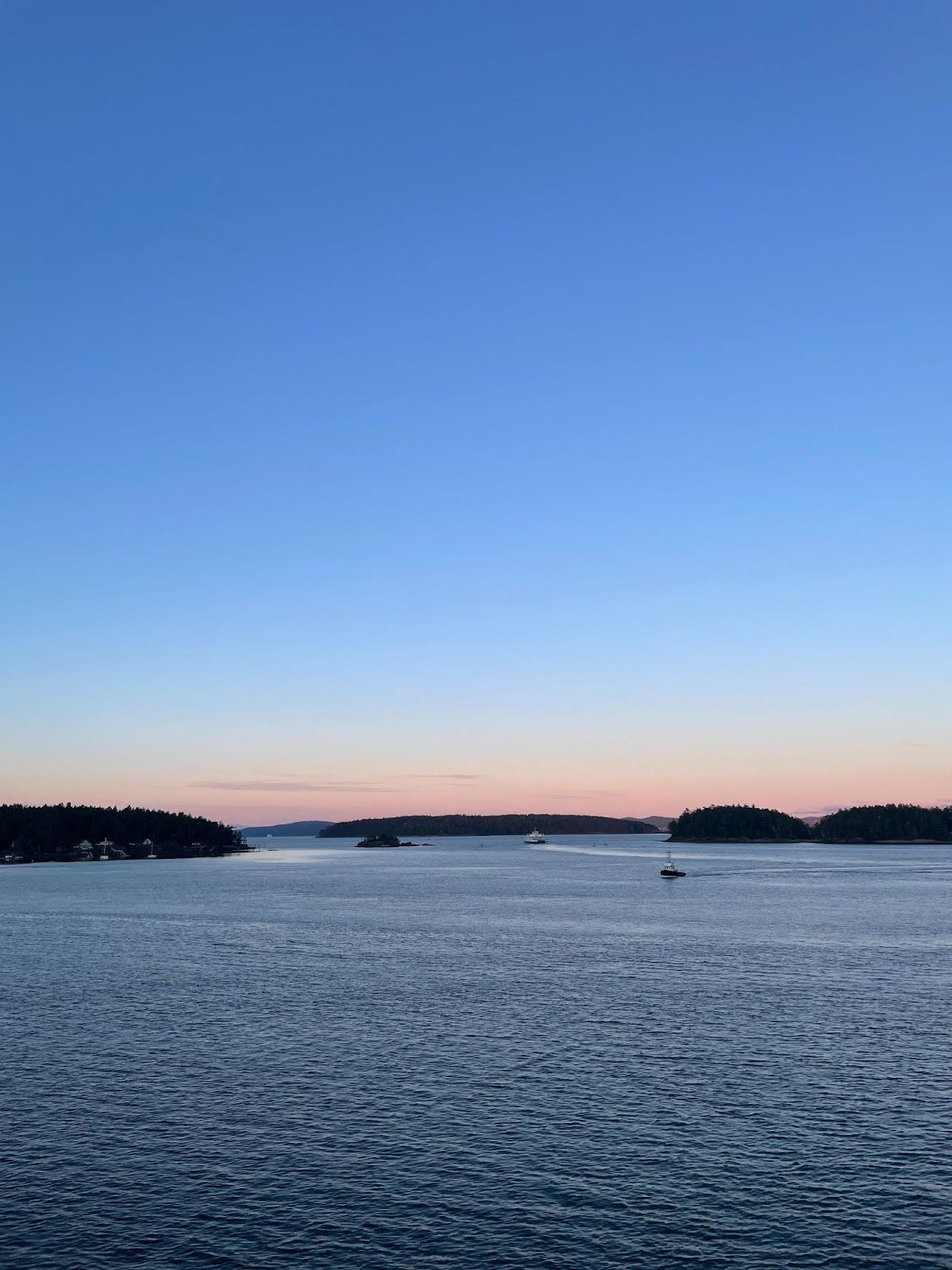Our sixth issue, SEA, is concluding. In it, contributors from around the world brought us stories of love and loss, seafood and salt, fishing and folk tales, and much, much more. It includes new formats like video and fiction, and you can find it in full here.
The Pacific Ocean is one of the things we miss most, living far away from where we grew up in Western Canada, so it seems fitting that as we write this Letter from the Editors for our SEA issue, we’re both back home breathing in the salty coastal air — just as we were right before the issue started. Every time we return to these rugged shores, we’re struck yet again with a feeling of awe at all that these waters can encompass and evoke.
This time, we’re additionally grateful to the contributors of our SEA issue for offering us new perspectives on these waves. This issue was about so much more than the title suggests: seas (and oceans and water more broadly) served as a portal to interrogate family and identity, food choices and appetites, climate change and gender, migration and movement, loss and longing. If we do say so ourselves, we think this was one of our best issues yet, and we encourage you to catch up on any pieces that you missed.
In our SEA issue:
Tender Seas* | Megumi Koiwai
Sea Moss Panna Cotta | Elise Schloff
A Fistful of Salt | Zoya Naaz Rehman
Fishing for a Future | Mélissa Godin and William Martin (video)
Kasila's Dream | Foday Mannah (originally published by Wasafiri)
Vera Town* | Isabela Vera
As Vast and Hungry as the Ocean | Branca Lessa de Sá
Whale politics | Isabela Vera with Troy Bright (podcast and short essay)
BONUS: Free divers, tsunami ladies, and fishy rituals (premium subscribers only)
BONUS: Fish farming and food colonialism | Amelia Cookson at Feedback Global
*Premium subscribers also get access to audio versions, read by the authors
Oceans of feeling
The first waves of SEA rolled out in September with a piece from Tokyo-based writer Megumi Koiwai titled “Tender Seas”. Reflecting on the short feature “nowhere to go but everywhere” — a film about one man’s 13-year quest to find his wife after she was swept away by 2011 the Tsunami in Japan — Megumi explores the concept of nurturing and who is “responsible” for it. She looks back at how the gendered expectations of care, including through food, shaped her relationships with her parents. Her candid descriptions of her childhood disdain for her mother and reverence for her father reveal just how insidious gender norms can be — but also offer us hope that things can change.
Mwegumi’s piece seemed a fitting beginning for an issue that ended up delving quite deeply into the complex relationships between children and their parents, and the oceans (literal and figurative) that both separate us from and bind us to our families. In “Vera Town”, Isabela Vera tells of her 600-kilometre pilgrimage to an eponymous town in the south of Spain — in part a quest to better understand her father — reflecting on the ways her family’s history, identity, and relationships have been shaped by migratory journeys across oceans.
In Branca Lessa de Sá’s “As Vast and Hungry as the Ocean,” she describes how the poetry of Anne Sexton (and Sylvia Plath, Audre Lorde, Mary Oliver, Marge Piercy, Anne Carson, and Adrienne Rich) helped her understand her mother, and in turn herself through their use of food and oceans as emblems of female desire. We love these pieces for the way they leverage such personal stories to provide profound insights into the broader politics of gender and identity.
Oceans of change
The thoughtful essay that accompanies Elise Schloff’s recipe for "Sea Moss Panna Cotta”, pulls on similar threads relating to family and identity, while also tackling some of the pressing issues related to the extraction of resources from our waters. Elise describes how the “scant happy memories” she has about her father from her childhood involve fish. In this piece, Elise reflects on the sentimental challenges of her choice, as a feminist, to become vegetarian, and later vegan, because of the ways it undermined her connection to the sea — and in turn her connection to home and family. In reconceptualizing seafood to include vegetal bounty, Elise’s recipe for sea moss panna cotta challenges us to think about the creative ways food cultures might evolve in the name of justice and care.
Isabela’s podcast “Whale Politics”, featuring a self-taught orca researcher Troy Bright, also touches on how lives — terrestrial and aquatic — are impacted by extractive industries. The accompanying essay offers a short meditation on climate grief. In the podcast, Troy shares his knowledge about orcas’ rich matriarchal societies, their unique food cultures, and their vulnerability as a result of our human food system. From there, the podcast draws links between the historical treatment of Indigenous women in the salmon canning industry and high levels of food insecurity among Indigenous and racialized women in British Colombia today.
That Indigenous women’s labour is critical to food systems is also picked up in Zoya Naaz Rehman’s well-researched essay “A Fistful of Salt”. This piece is about salt production the India, the world’s third-largest salt producer, and is set in Gujarat’s salt flats, where Indigenous Agariya women produce much of the salt in artisanal ways. Zoya looks at how socially and colonially constructed caste categories, economic liberalization, and wildlife conservation policies have compounded to marginalize Agariya women, and notes that their battle to be recognized as rightful tenants of the land is still ongoing.
We finished SEA with a guest post by Amelia Cookson at Feedback Global on the geopolitical dynamics and unequal harms of industrial aquaculture. In “Farmed Fish and Food Colonialism”, she provides us with a synopsis of the gender issues highlighted in Feedback’s latest report, Blue Empire. It highlights the big business involved in overfishing small fish rich in essential micronutrients from the coast of West Africa to turn into feed for farmed salmon in Norway. These dynamics create a new form of food imperialism that harms women's health and livelihoods in the so-called Global South in the name of feeding consumers in the Global North. Just as “food-feed competition” is a critical issue when it comes to industrial livestock, it is for aquaculture, with global implications.
New formats for FFJ
We’re reminded of the gendered stakes of overusing our planet and its waters in “Fishing for a Future” through the heart-wrenching story of a young girl named Fanny. Growing up in a fishing village on the shores of Lake Malawi, Fanny’s life and future are being shaped by climate change and the lake’s dwindling fish stocks. This is the first-ever video piece published by FFJ, and it came to us from the makers of Daughters of Drought, a documentary film project by Mélissa Godin and William Martin. It offers a powerful reminder of the tens of thousands of lives that are irreversibly changed each year that we fail to meaningfully confront the climate crisis.
SEA also included our first-ever piece of fiction! "Kasila's Dream", an enchanting short story by Foday Mannah, was shortlisted for the 2022 Queen Mary Wasafiri New Writing Prize, and first published at wasafiri.org by Wasafiri, the magazine for international contemporary writing. The story begins when Halima’s father, an esteemed fisherman, is swallowed by Kasila (the Water Devil) as payment for the village’s fishing exploits. In turn, Halima’s mother coaches her to enter Kasila’s dream and fulfil her family’s legacy: to become one of the powerful women to whom Kasila reveals her fish recipes. We were fascinated by the way women’s dexterity in the kitchen is portrayed not as something forced upon them by societal norms (as described by Megumi about Japan), but as something cultivated and revered — a superpower.
We’d love to hear your thoughts on SEA. What pieces did you love? What other topics do you wish we’d covered? Let us know in the comments below.
Coming up next: MEAT, and another very exciting project
As some of you may have seen on social media, FFJ is very excited to be taking on a new kind of project in the months ahead. We’ll be collaborating with Wedu and AGREA Foundation to deliver the 10th U.S.-ASEAN Women's Leadership Academy for YSEALI. For our part, we'll be working with the more than sixty program participants — young women leading food security in Southeast Asia — to produce a digital zine tracing the lifecycle of a grain of rice at each stage of the food value chain. We’ll share more on that as it progresses!
In the meantime, we’ll be taking a month-long hiatus to put the finishing touches on our next issue, MEAT. We promise it will be worth the wait: we have deliciously challenging content on cannibalism, queerness and cookouts, masculinity and meat consumption, Zambian perspectives on Carol J. Adams, and more coming your way. And you can still expect some archive content from us in the weeks ahead! We have some WAR pieces that we’d love to finally see the light of day, aka your inbox.
Thank you, as always, for being part of our community.









